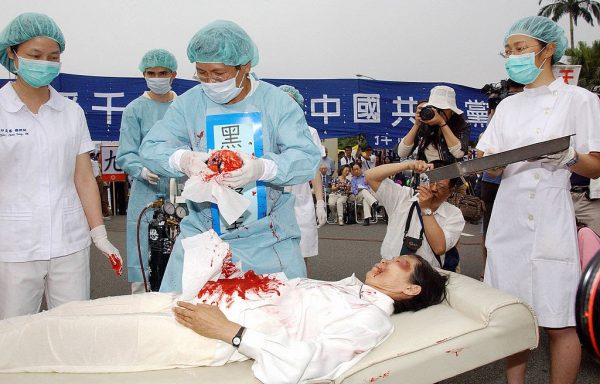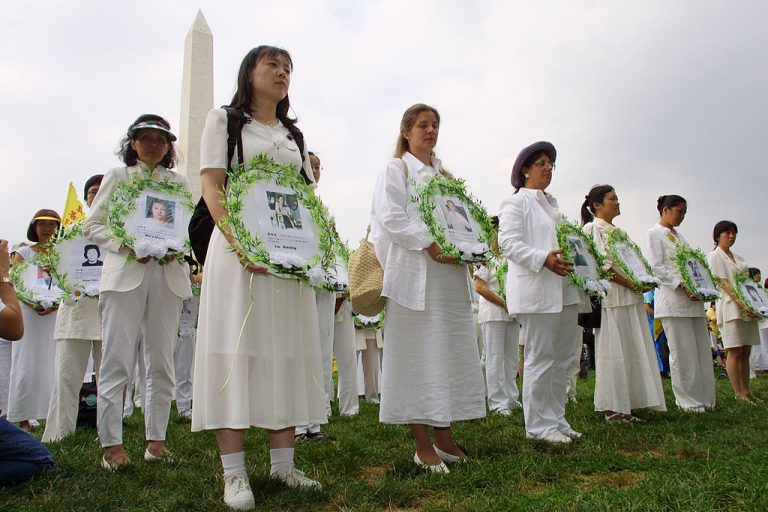An annual religious freedom report by a Christian rights organization has determined the Falun Gong meditation practice to be the largest spiritual group in mainland China facing persecution at the hands of the Chinese Communist Party (CCP).
In its 2021 Religious Freedom Report (RFR), Aid to the Church In Need International (ACN) points out the hypocrisy inherent in Communist Party policy by first citing Article 36 of the People’s Republic of China’s 1982 Constitution, “Citizens of the People’s Republic of China enjoy freedom of religious belief. No state organ, public organization or individual may compel citizens to believe in, or not to believe in, any religion; nor may they discriminate against citizens who believe in, or do not believe in, any religion.”
ACN then clarifies that Article 36 only protects what it calls “normal religious activities,” which are not clearly defined in the text of the Constitution. Simultaneously, the text states religions must not either “disrupt public order, impair the health of citizens or interfere with the educational system of the state” or be “subject to any foreign domination.”
The group says that in reality, the PRC’s Constitution only protects the five major religions defined as “Buddhism, Taoism, Islam, Protestantism and Catholicism,” but more specifically, “only those governed by seven state-sanctioned ‘patriotic’ associations.”
Perhaps most somberly, the RFR reveals that the Party’s notorious United Front Work Department is the organ in charge of managing religion in China, “Since March 2018, religion has been under the direction of the United Front Work Department (UFWD), an agency of the Chinese Communist Party (CCP), thus taking over the State Administration of Religious Affairs (SARA). As a result, the CCP has direct control over religious affairs.”
Success
You are now signed up for our newsletter
Success
Check your email to complete sign up
In 2018, the U.S. China Economic and Security Review Commission (USCESRC) released a report entitled “China’s Overseas United Front Work – Background and Implications for the United States.” While the Report is primarily focused on the impact of United Front operations in relation to U.S. foreign policy concerns, in the Executive Summary, the first sentence is succinct in summing up the danger the UFWD poses when it comes to China’s internal religious freedoms, “China uses what it calls ‘United Front’ work to co-opt and neutralize sources of potential opposition to the policies and authority of its ruling Chinese Communist Party (CCP).”
The USCESRC Report says the UFWD “mostly focuses on the management of potential opposition groups inside China,” but adds it “also has an important foreign influence mission.”
‘The largest spiritual group in China facing severe persecution’
The ACN Religious Freedoms Report puts its emphasis on concerns over the verbiage on religious freedoms in Hong Kong’s CCP-sponsored National Security Law and, naturally, focuses heavily on the Party’s persecution of Christians and the genocide of Uyghur Muslims in the Xinjiang Autonomous Zone, with a minority emphasis on the persecution of Tibetan Buddhists.
Although the comments are merely two paragraphs buried in the middle of a long section on Page 4 of 7 in the China portion of the RFR, the ACN makes what is often a rare admission for any non-profit or non-government organization, whether of a human rights characteristic or not, on the 21-year-long persecution of Falun Gong.
“Perhaps the largest spiritual group in China facing severe persecution is Falun Gong, a movement that draws on Buddhist tradition. Described [by the CCP] as ‘xie jiao’ (heterodox teachings or evil cults), Falun Gong is banned,” says the Report, adding “In 2019, thousands of practitioners were arrested for practising the meditation exercises.”

“In 2019, an independent inquiry into allegations of forced organ harvesting from prisoners of conscience, chaired by British barrister Sir Geoffrey Nice QC, concluded ‘beyond reasonable doubt’ that ‘forced organ harvesting has been committed for years throughout China on a significant scale…and Falun Gong practitioners have been one – and probably the main – source of organ supply,’” said the Report.
The China Tribunal, an independently organized tribunal said of itself in the Introduction of its 62-page Summary Judgment on the case of the CCP’s notorious forced organ harvesting of Falun Gong practitioners, “This is the unanimous judgment of…a ‘People’s Tribunal’ formed, as others have been, to make a decision about an important issue of public concern not dealt with elsewhere. It was formed by ‘The International Coalition To End Transplant Abuse In China’ (ETAC), a not-for-profit coalition of lawyers, medical professionals and others dedicated to ending what they assert to have been, and to be, the practice of forced organ harvesting in China.”
“ETAC’s main interest has been the alleged suffering of practitioners of ‘Falun Gong’, a group performing meditative exercises and pursuing Truthfulness, Compassion, and Forbearance, but regarded by the People’s Republic of China (PRC) since 1999 as an ‘anti-humanitarian, anti-society and anti-science cult.”
21 years too long
Falun Gong (法輪功), also known as Falun Dafa (法輪大法) (Great Law of the Law Wheel), is a form of qigong meditative exercises first taught in 1992 by its founder, Li Hongzhi, during the height of China’s qigong boom. The practice, with its emphasis on its guiding principles of Zhen-Shan-Ren (真善忍) (Truthfulness, Compassion, Forbearance) and improvement of the practitioner’s personal xinxing (心性) (character) during daily life and interpersonal and social conflicts, gained enormous popularity, garnering the support of roughly 100 million Chinese citizens, including countless professionals and even Communist Party members.
Jiang Zemin, leader of the CCP at the time, regarded the practice as a threat to his personal power and ambitions for fame. On July 20, 1999, he launched what can be regarded as the most widespread and vicious persecution in human history.
During the 21 years since the persecution began, according to Clearwisdom, a U.S.-based website founded by Falun Gong practitioners, 4363 practitioners have been confirmed as murdered by the Party during the persecution. However, based on first-hand accounts they have managed to receive from those living under perpetual harassment by the Party’s various security apparatuses, the practice’s adherents speculate the real number to be in the hundreds of thousands or even millions.
Clearwisdom remarks that what the peaceful practice endures at the hands of the CCP is not limited merely to murder, “In addition to the deaths, over 100,000 have been sentenced to forced labor camps. Many thousand mentally-healthy practitioners have been locked up in psychiatric hospitals, brutally beaten, and drugged into submission with anti-psychotic drugs.”
“Huge numbers have been forced into brainwashing sessions organized to coerce them to renounce their beliefs. Tens of thousands have been detained, jailed and/or imprisoned.”
The site, which houses countless first-hand reports from both practitioners who are still living in the mainland and who have found refuge in countries such as the United States, continues, “Torture is widespread and systematic, ordered by top Party officials to help wipe out the practice. Police and CCP officials at all levels routinely extort huge sums from those they threaten and arrest, and their families.”
“Countless families have been broken up, and countless practitioners dare not return to their homes, wanting to avoid arrest and to protect their families and friends from the CCP’s guilt-by-association policy.”
















